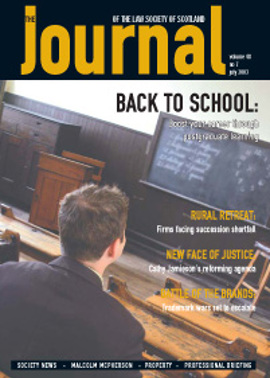Scottish Solicitors’ Discipline Tribunal
A Complaint was made by the Council of the Law Society of Scotland against George Lee McQuitty, Solicitor, Dalgairn, Cupar, Fife (“the Respondent”). The Tribunal found the Respondent guilty of professional misconduct in respect of his acting in a dishonest fashion by charging fees which were grossly excessive, unreasonable, unfair and overstated all in breach of Article 6 and 7 of the Code of Conduct for Solicitors holding Practising Certificates issued by the Law Society of Scotland in 1989. The Tribunal Censured the Respondent and fined him in the sum of £3,000 to be forfeit to Her Majesty and suspended the Respondent from practice for a period of two years.
The Respondent had accepted that his conduct in grossly overcharging fees amounted to professional misconduct. The Tribunal had to decide whether or not his gross overcharging was dishonest. The Tribunal considered that the Respondent having been in practice for twenty years dealing with a great number of executries must have known he was grossly overcharging fees to the executry. The Tribunal was satisfied beyond reasonable doubt that the Respondent acted dishonestly in taking the fees which were so grossly excessive that he must have known he was not entitled to them. The Tribunal viewed the case very seriously given the finding that the Respondent had dishonestly grossly overcharged fees. It is an essential and absolute quality of a solicitor to be honest and truthful and to act in such a way that their personal integrity is beyond question. The public expects and is entitled to expect solicitors to be honest and to act in such a way that their personal integrity is beyond question. A solicitor who falls short of this brings the profession into disrepute. Article 6 of the Code of Conduct for Solicitors holding Practising Certificates issued by the Law Society in 1989 requires that fees charged by solicitors shall be fair and reasonable in all the circumstances. In this case the fees charged by the Respondent were three times the amount fixed by the Auditor of the Court of Session.
The Tribunal however took into account that this was the only incident in the Respondent’s long career. The Respondent had made no attempt to hide what had happened and had put the money back into the executry. The Respondent had also had the matter hanging over him for a considerable period. In the circumstances the Tribunal did not consider it necessary to strike the Respondent from the Roll and imposed a Censure, a fine of £3,000 and two year suspension.
In this issue
- Firms lack capital ambition
- Rural law firms facing issues of succession
- Acquiring masters degree can be rewarding business
- Laying firm foundations for future growth
- Registering a trademark makes patently good sense
- What makes a good partner?
- Claims information before merger options
- Shortcut routine procedures by simple codes
- Jamieson arrives with reforming agenda
- Refining details of new civil legal aid scheme
- Round the houses
- Take care with the crave
- Essentials of the anonymous Budget
- Changing duty on commercial leases
- Scottish Solicitors’ Discipline Tribunal
- Planning for the future – simplicity itself?
- Website reviews
- Book reviews
- Commercial property transactions common standard






